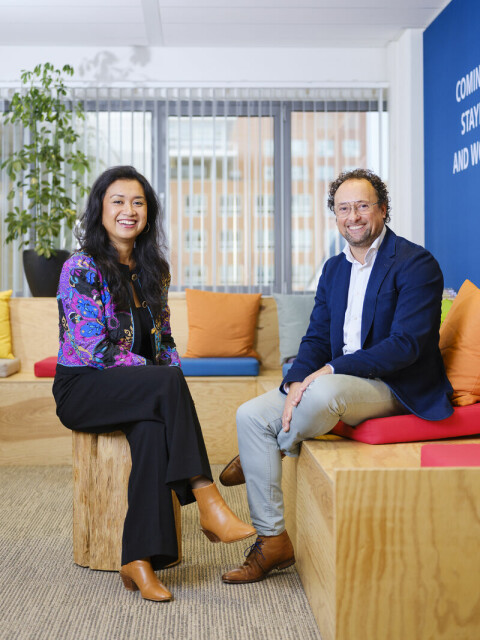
April 5th 2024
We have to give each other space
- Employment best practice
- OF THE
- Support base
- Partnership
Since its founding in 1901, ISS, partner of Refugee Talent Hub, has grown into a global player in facility services, with more than 350,000 employees. Connecting people and places is the essence of their existence. Partnership 'Together for a job' spoke to Robert Oosting and Hanni Wongsosumarto, and wrote an article about it.
Please note: this article was translated using a translator appRobert Oosting, Head of Diversity & Inclusion and Hanni Wongsosumarto, Project Manager Diversity & Inclusion explain how they convey that essence in their role within ISS Netherlands. Hanni: "I give concrete substance to D&I within the organization by working on projects in which we offer development opportunities to people from certain target groups. But I also try to create awareness for themes such as pride, cultural diversity and unconscious prejudices. The head office provides direction. to the global D&I policy and it is our job to make the translation for the Netherlands." Robert: "When the participation law came into effect around 2015, we developed a management model in which our managers themselves manage a broader target group that now accounts for about 10% of our workforce. We have operational managers in the field who are committed to subject. And we have so far trained 165 work supervisors who lead this group.”
More diverse team: more innovation, more creativity, more productivity
The target group that ISS works with is broad. People with a need for support, such as with an indication of a job agreement, status holders, people on social assistance benefits or young people. Various studies show that a company with a diverse workforce enjoys higher profits, more productivity and a more positive image. Can ISS confirm these results? Robert: "A more diverse team challenges each other more from different perspectives. You get more innovation, more creativity. In addition to a social value, diversity certainly also has a financial value. "It has a positive impact on many things. Working with a diverse team has a positive effect on employees. When colleagues see that someone shows up to work on time and motivated every day, despite his or her limitations, it has a positive impact on the rest of the team. This also indirectly increases the operating result."
It starts with leadership
ISS's global D&I strategy is based on five pillars: Gender Balance, Culture & Ethnicity, Generation & Age, Pride and Abilities. Based on these pillars, Employee Resource Groups (ERGs) have been established in the Netherlands. Robert: "These groups consist of employees with an intrinsic motivation for the subject and a sponsor from management. That is important to get the drive going. Because it starts with leadership. If management does not give a clear signal what the importance of D&I, it will not get off the ground quickly. The ultimate success depends on everyone in the organization, no matter what role you are in."
Personal motivation runs deep
Hanni and Robert's personal motivation to commit to D&I within their organization runs deep for both of them. Hanni: "In my previous job I supported refugees. I then experienced up close the impact of inclusion and exclusion and learned about the importance of justice. It also touched me personally because I was then given words to express the feeling that I had always I had a desire to belong somewhere. I often had the feeling that I was different , but just different. Being different is a strength, but the downside is also sad and lonely. I have struggled with that and I want to help others with that."
Robert's motivation also goes back a long way. "My roots are in Johannesburg, South Africa and I grew up with the consequences of the apartheid system. From an early age I have been aware of the fact that there are systems aimed at distinguishing people based on ethnicity or skin color. That leaves its mark and a deep-seated urge to fight for equality in any form. It is not a hobby, it is something that takes a lot of time. I have been doing this work for a long time and it is a mission. It takes a lot of time to overcome resistance. I am convinced that intrinsic motivation will take you a lot further than just being assigned this as a task."
Speaking of resistance, how do they deal with it? Hanni: "We always try to convey the message: look beyond your assumptions. Ask questions, start a conversation. And resistance is not a bad thing either, it is ultimately part of the process. Part of the journey we are all on. We have to give each other the time to go along with the ideas of the other. Everyone has different beliefs and different ambitions, that is important within D&I."
Finally, a tip for other companies: "Look at what suits you as an organization. Create inclusivity that suits the company. Start small. If you can embed it in your positioning, then it is sustainable. And be aware of it that it is a continuous process of learning and discovery. There are many opportunities and we still have a lot to do. Let's learn from each other."
---
This article is an adapted version of the interview that previously appeared in Inclusief Magazine #5. This magazine is published by 'Together for a job', the inclusive employers' network in the Midden-Gelderland region consisting of Werkgeversservicepunt Midden-Gelderland, Scalabor, UWV and Inclusief Midden-Gelderland foundation. Read the entire magazine here .